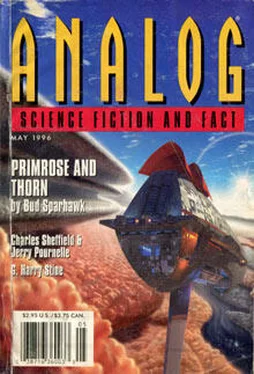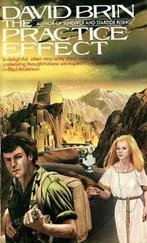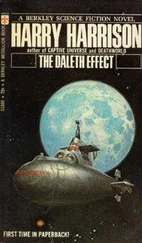G. Nordley - The Kubota Effect
Здесь есть возможность читать онлайн «G. Nordley - The Kubota Effect» весь текст электронной книги совершенно бесплатно (целиком полную версию без сокращений). В некоторых случаях можно слушать аудио, скачать через торрент в формате fb2 и присутствует краткое содержание. Год выпуска: 1996, Издательство: Dell Magazines, Жанр: Фантастика и фэнтези, на английском языке. Описание произведения, (предисловие) а так же отзывы посетителей доступны на портале библиотеки ЛибКат.
- Название:The Kubota Effect
- Автор:
- Издательство:Dell Magazines
- Жанр:
- Год:1996
- ISBN:нет данных
- Рейтинг книги:5 / 5. Голосов: 1
-
Избранное:Добавить в избранное
- Отзывы:
-
Ваша оценка:
- 100
- 1
- 2
- 3
- 4
- 5
The Kubota Effect: краткое содержание, описание и аннотация
Предлагаем к чтению аннотацию, описание, краткое содержание или предисловие (зависит от того, что написал сам автор книги «The Kubota Effect»). Если вы не нашли необходимую информацию о книге — напишите в комментариях, мы постараемся отыскать её.
The Kubota Effect — читать онлайн бесплатно полную книгу (весь текст) целиком
Ниже представлен текст книги, разбитый по страницам. Система сохранения места последней прочитанной страницы, позволяет с удобством читать онлайн бесплатно книгу «The Kubota Effect», без необходимости каждый раз заново искать на чём Вы остановились. Поставьте закладку, и сможете в любой момент перейти на страницу, на которой закончили чтение.
Интервал:
Закладка:
The Kubota Effect
by G. David Nordley

Illustration by Steve Cavallo
“Eureka!” Hiro “Jack” Kubota shouted and a thousand echoes answered from the empty halls of the deserted underground lab. He jumped, maybe half a meter off the ground—there was no one to watch him. With a trembling hand he selected “print” from the menu of his Granny Smith. Eight years in this surplus would-be superconducting supercollider tunnel, and, finally, he had done it.
The equipment sat there just like it had five minutes ago. But then it had just been an experiment. Now it was a compact antiproton factory, a prototype for something that could change the course of history.
It’s going to belong to the Smithsonian someday, he thought dizzily; I’d better be careful with it. The power could go down, the data could be lost, he might be unable to replicate the experiment and there would be only his word—the nightmare of being the participant in another cold fusion fiasco paralyzed his hand. Print it! Now! he told himself, and shaking himself willfully out of that train of morbid thoughts, he tapped the key.
In moments, the pictures of the particle paths slipped into his printer tray. Hard copy. Permanent. Real. With trembling hands he picked up the sheets—it was beautiful, elegant, as something of such significance should be. The particle traces looked like a perfect symmetrical flower, positive pions curling left, negative pions right, protons curving left, a thin trace of fluorescence down the center where the neutral particles accidentally disturbed an electron or two, and of antiprotons. Antimatter. Electricity in, antimatter out. He’d done it!
“Banzai!” Jack jumped high again, feeling for a moment he could sail through the dozen meters of rock and prairie above him like a neutrino. The old tunnels could not contain his joy. Still shaking, he sat down. He should make more measurements, file an e-mail note, tell Dr. Grimski. Take radiation readings—he hadn’t really expected it to work so well and that stream of antiprotons represented several joules of hard radiation. He’d have to be careful not to endanger his and Gina’s future children!
A tear of joy dropped on the printout-careful, that’s going to the Smithsonian, too. The pion traces were thin, delicate. They were the noise—careful tuning should eliminate them, and the neutrons and antineutrons as well. The protons couldn’t be helped—but, he chuckled—so what! He had proof of principle that antiprotons could be made at efficiencies approaching 50 percent of their energy cost. That was revolutionary; antihydrogen made by solar power satellites could replace uranium and plutonium in power plants. Antihydrogen-powered rockets could fly to orbit like airliners, with airliner payloads. Doctors could attack cancer with a tenth of the normal radiation side effects…
At least it ought to get him his doctorate!
Gina! He had to call Gina. He looked at his watch; she should be at the neutrino observatory, three kilometers down the curved tunnel.
“Artoo,” he told his computer, “call—”
“Hold it!” a loud voice announced. It sounded as cold and solid as the concrete walls from which it echoed, and dripped with condensed authority.
Jack spun around in his ancient surplus swivel chair. “Who the…” The sight of the gun in the man’s hand shocked Jack into silence; he knew next to nothing about guns. This was large, smooth and squarish—nothing like a cowboy revolver, and no gadgets on it that he could see. The mean-looking hole in the end of it might have been a centimeter across. With the light from his desk lamp behind him, he could almost see into the barrel. “Who a re you? ”
“Don’t even think of trying to find out, if you want to live.” The speaker was wearing a black trench coat, as if out of a spy novel.
The face was very ordinary, though a little hard. Jack studied the face, trying to note details, but he knew he probably wouldn’t recognize it in another context. He even had problems with Japanese faces, and he was raised there. Nonetheless, he noted that the hair was straight and black, with a touch of gray at the temples. The man was big, just under two meters and probably over a hundred kilos—twice Jack’s mass. He could have been anywhere from forty to seventy.
The gunman carried himself as if he were used to moving quickly. Jack saw no sign of softness or flab—but no sign of malnourishment either. The hand that held the gun was very steady.
“Sit down and keep your hands on your lap where I can see them.”
As he backed into the ancient swivel chair, Jack’s life passed in front of him—not the life he’d lived, but the one he hoped to have with Gina. A small college somewhere, a low pressure place where they could teach and do research. A child or two, a book written the way a textbook ought to be written. It could all be gone in the next millisecond. It wasn’t fair.
“What… what do you want?”
“That.” The gun pointed briefly to the apparatus, then returned to a boresight that must have been aimed between Jack’s eyes. “I’ve been waiting. Thought you might make it last week. That’s what I’m after.”
“But, but it’s big. It’s all over the place. It would take days to take it out, especially if you ever wanted it to work again. And it only produces a few picograms—nothing of any practical use. Unless you have a brain tumor?”
Was that it? They’d been treating people experimentally at Fermilab for years, shooting antiprotons into brain tumors that couldn’t be touched otherwise. It worked, but it was very expensive. Jack felt a moment of pity—a desperate man, his thinking perhaps already impaired, taking a wild risk when he had nothing else to lose.
“I’m not a doctor,” Jack continued, calming now that he imagined he had a handle on the situation. “But it’s not out of the question that we could try something like that. It would take a couple of weeks to get ready, but if you’re really hurting I’m sure there are people who—”
A brief smile cracked the hard face. “I’m sure the people I work for will find ways of making money off this. Now, do you have some electrical tape?”
Jack nodded to a workbench across the tunnel from his desk. It was covered by a mass of miscellaneous equipment; flanges, meters, pliers, strangely shaped pieces of metal and plastic, and yes, no less than three rolls of colored electrical tape. Jack color-tagged his wiring, whenever he thought of it.
“Good. I want you to take a piece and cover up the infrared phone port before either of us says anything more. Don’t even think of trying to do anything else.” He motioned with his gun to the workbench.
Jack got up slowly, went to the bench and cut off a piece of tape. The phone box was on the utility pole next to the light switch a few meters down the tunnel. He walked to it slowly, thinking furiously. If he could leave just a little part of the dime-sized infrared pickup uncovered, he might get through by pointing his computer’s transmitter window directly at the light box.
“Don’t even think about it, or you’ll lose everything,” the man with the gun said, as if he were reading Jack’s mind.
He was right. As long as Jack got out of this alive, they could put it all back together again. All he had to do was to keep cool and do exactly what this thug told him to do. He put the tape over the infrared window. No calls, no Internet. He was suddenly aware of the utter isolation of this section of tunnel. The cleaning staff came by weekly and Gina occasionally, but other than that, he could—and had—spent weeks without a visitor. The gunman could have been watching him for days, and no one would have noticed.
Читать дальшеИнтервал:
Закладка:
Похожие книги на «The Kubota Effect»
Представляем Вашему вниманию похожие книги на «The Kubota Effect» списком для выбора. Мы отобрали схожую по названию и смыслу литературу в надежде предоставить читателям больше вариантов отыскать новые, интересные, ещё непрочитанные произведения.
Обсуждение, отзывы о книге «The Kubota Effect» и просто собственные мнения читателей. Оставьте ваши комментарии, напишите, что Вы думаете о произведении, его смысле или главных героях. Укажите что конкретно понравилось, а что нет, и почему Вы так считаете.











